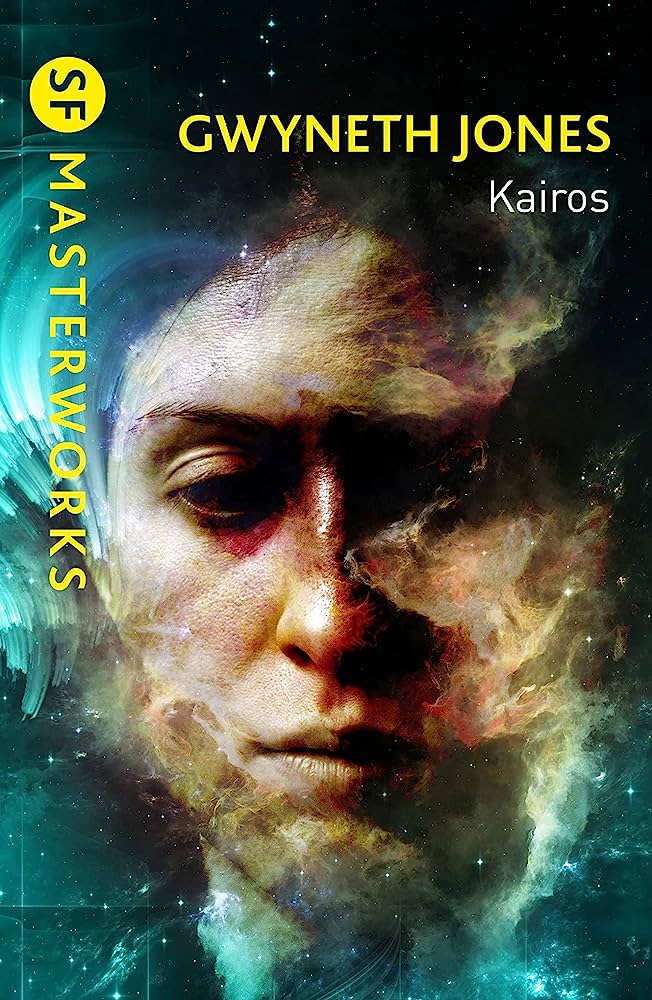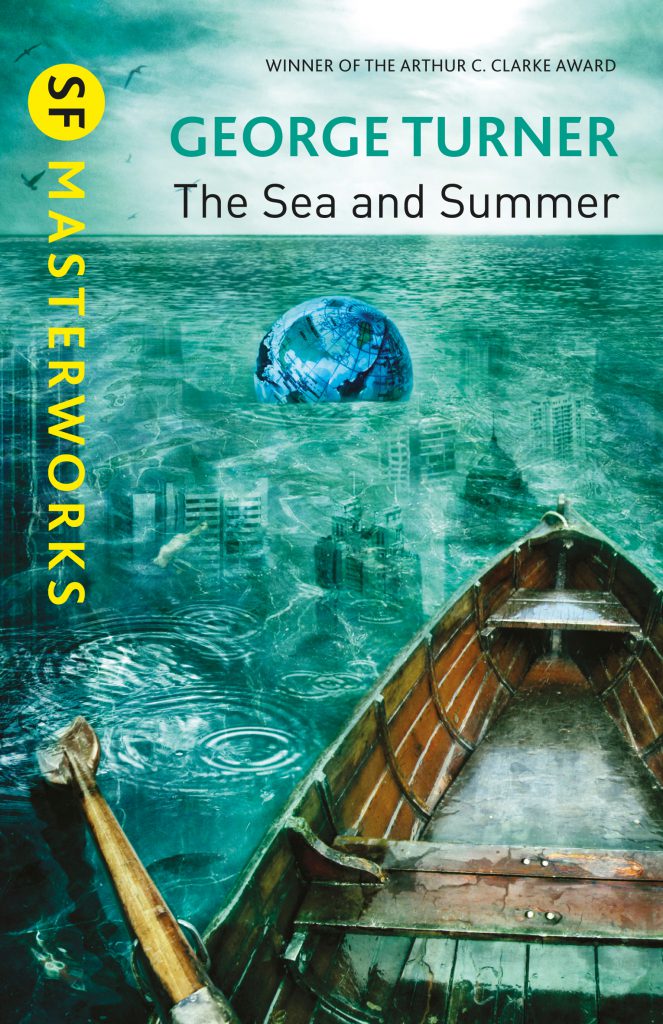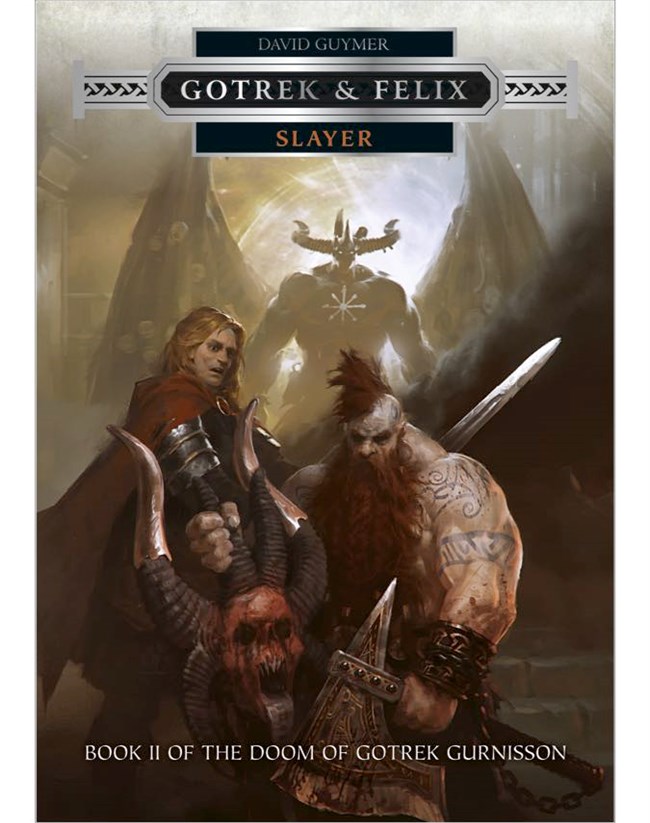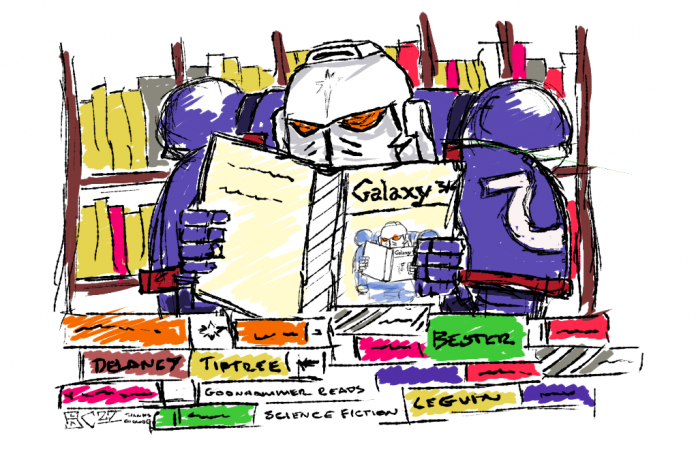I don’t know about you lot, but occasionally I like to read that the world could, infact, get worse. There’s a certain comfort in hard times you can get by reading the world not just slightly, but impossibly, apocalyptically worse. As we careen ever closer to one of the various catastrophes looming in our immediate future, let’s dive into some classic Scifi to distract us from the tire fire of our daily existence.
With that cheery introduction, welcome back to Goonhammer Reads Science Fiction.
When I think about Science Fiction, one of the great enduring staples of the genre is the post-apocalyptic scenario, men and women emerging, blinking, from their bunkers or secluded rural retreats to find the world around them irrevocably gone in the blink of an eye, bite of a zombie or deathrattle of a plague. There’s a clear set of steps that these novels work through. They don’t always get through all of them, but it’s usually something like this:
- Our heroes exist in the world
- Something changes and the world as we know it starts to fall apart
- The Apocalyptic Moment
- The post-fuck-flush of lawlessness and chaos
- Recovery or Dissolution in a post-apocalyptic world
- The last word
This month we’re going to focus right in on the first two – books that crystallise not the brave new monstrous world, but the slow frog boiling of the apocalypse in motion.
Ending the World
Science Fiction authors love playing around in our-world-but-worse, whether that’s humanity coping with an existential threat, or strange post-apocalyptic scenarios of survival and rediscovery, or even just the whole concept of cyberpunk being our hyper-capitalism disasterfest ramped up the most miniscule of notches. Tearing down the world around us can form a warning, a parable, a lesson or just a bloody good adventure. Where Scifi challenges us most – and where it rises above and beyond fantasy (I can hear the fantasy fan knives being sharpened here) is the direct challenges to our world that it poses. That’s not to say that all Scifi dealing with the apocalypse does this. There’s a huge and storied sub-genre of Scifi where authors (mainly male, mainly writing golden age style novels long after they should know better) just describe how the world ends, and the steps that their brave scientists take to do something about it. The scientists fail, except perhaps a brave Musk-like industrial prophet makes some kind of product that will save the future, and no lessons are learned. The destruction of the Earth serves as a bombastic backdrop for nothing at all very interesting. If you want to try this genre, check out the best versions of it – Greg Bear’s Blood Music and Forge of God – but beware reading too many as they can get pretty samey.

Novels that focus on the process of the apocalypse, and leave us as readers in the harsh light of a new dawn, have a different pull to the surviving the apocalypse strain – the slow, inexorable rush towards the end, the slow drip drip drip of catastrophe and the natural and (hopefully) perfectly formed cliffhanger of “what the hell do our heroes do now?” all makes for tense, anxious, perturbing reading. All of that pressure is used to ask difficult questions of the reader, and nowhere in Scifi do you get more direct, more pressing and more impactful questions than in that apocalyptic process, when the best writers tear down worlds in order to save ours.
We’ll start off least realistic and progress, because otherwise we’d get very, very depressed at the last recommend.
The Kraken Wakes, John Wyndham
Extremely English radio Journalists Mike and Phyllis Watson are honeymooning out on the open ocean when they witness a mysterious fireball sink into the sea. As the people on the ground they’re drawn into reporting on the strange, slow horror emerging in the deep dark, as whatever they are doing down there starts to first change, and then destroy, the world above.

Wyndham is really the master of the apocalypse and, in this and the slightly worse Day of the Triffids, has a lot of fun (and a lot of 1950’s horror) tearing the world to pieces as stiff-upper-lipped Brits look on in shock and horror. Where Triffids is the archetypical waking up after the apocalypse novel, Kraken is the cold creeping horror of the inexorable and inexplicable end. The Aliens here – if Aliens they are – are never seen or heard from. They attack without warning and take their human prey in a truly terrifying and horrific way for an early 50s novel. Wyndham ramps up from some still very well written but not very apocalyptic standing around smoking and talking about something at the beginning into full on alien invasion and then, finally, into the dissolution of European (and presumably world) society under 100-something feet of risen tide, unfortunately a lower level of inundation than we’re expecting on an earth without aliens.
Kraken is the calmest apocalypse you’re likely to read, and I think in that there’s a lot of truth. Many characters refuse to believe the classic Mad/Angry Scientist. Military guys believe in Military solutions. Politicians try political manoeuvring at inappropriate times. Noone is prepared, but largely instead of panicking, they slowly freeze in place as the world worsens, deer in the headlights or head in the sand. When there’s nothing you can do, what do you do? You slowly fall apart and head into dark places.
There are, hilariously, some serious differences between the US and UK versions, to the point when I really wouldn’t bother reading the US one. It’s already a book written in the early 50s, so screaming bloody horror and murder it aint, but the US version strips out everything that might be considered even slightly emotional or, well, apocalyptic about the Watsons coping with the end of days. There’s a lot of stick out there (particularly from American authors) about Wyndham being “cosy” and if that’s the version you’re reading, I can see why.
Kairos, Gwyneth Jones
Otto and Sandy are revolutionaries, but the revolution never quite came. Standing still in a decaying, austere, class, gender and ideologically divided Britain, the world they wanted is crumbling to dust around them. New advances in pharmacology and a sinister quasi-religious cult make that metaphorical apocalypse a mental, existential and terrifyingly real prospect as everything internal and external starts to slip into madness.

Kairos is a damn good book from a damn good author. Lots of Gwyneth Jones’ scifi is great, lots of it explores the intersection between internal and external worlds and, in all of it, the social, political or biological apocalypse hangs threateningly just over the horizon. But here, in Kairos, she lays claim to being one of the newest additions to the pantheon of “classic” Scifi authors. Kairos is a couple of things – and all of them well – in that it’s a Ubik-style teardown of external realities in favour of internal ones, a novel of the slow collapse of the British state (and too fucking real) and a dissection of a relationship. If you were a lefty twentysomething with big dreams of change, and now you’re a lefty thirty and fortysomething living on TERF island, you’ll find far too much to be apocalyptic about this novel.
To get you through the many apocalypses (apocalypsii?) that Kairos presents, it’s full of well developed and strangely familiar characters and situations – the domestic life of a certain class and time nailed firmly to the wall and left for us to study – and a creeping sense of spiralling madness that you don’t find better done outside of Philip K Dick. There’s love and hatred, hope and despair, the love of a boy for his dog, uncomfortably real explorations of gender and sexual identity and a projection forward of 1980s militant lesbianism into a political force in a dying Britain. Gwyneth Jones wrote a very interesting article about Kairos in the context of feminist science fiction, politics and the apocalypse here – one that sparked the idea of this article theme.
It is, more than anything else, a very good read, and if this article is about what we can learn from the Scifi apocalypse, Kairos tells us very firmly that it’s happening right now, for all that the reality-altering drug at the heart of the novel is a fiction – or at least, I hope it’s a fiction, but that there is hope if we hold to our beliefs and our politics, and that we can create a new and better world from the rubble of this one.
Sea and Summer, George Turner
The Conways live in Melbourne, a sun-bleached crumbling metropolis, slowly being swallowed by rising tides of water and wrenching poverty (and all the violence, neo-feudalism and inequality it brings) both. With society divided into haves (the Sweet) and have-nots-whose-shits-been-stolen-by-the-haves (the Swill), the boys rely on local almost-warlord Billy Kovacs for everything as he tries to hold onto power, resources and hope. The world increasingly falling apart around them and tensions building ever higher something has to give, and it isn’t going to be the Swill. Not without a fight, anyway.

People often point to Scifi as prophetic because Arthur C Clarke invented the idea of a geostationary comms satellite, or because Star Trek had flip phones. But really it’s prophetic because an Australian writer in his mid 70s wrote the history of the 2030s in 1987. Sea and Summer is not eerily prophetic in a hackneyed or general way, but in the manner of someone who did the research, paid attention, drew legitimate conclusions and then, in the year of my birth, explained exactly what the remainder of the 20th century would deliver for the 21st. It’s a melancholy, gritty, gothic book that drowns characters in the crushing, inexorable social apocalypse they’re living through as much as the waters rising with the destruction of the Arctic ice sheet. Throughout though, you’re watching relatable, understandable, characters holding onto the last embers of the past with a death-grip and while noone in here is a hero, there are definitely villains at play.
It’s a novel within a post-apocalyptic framing device, a structure that if I’m honest I bloody hate (with one exception) because it usually serves as a cheap joke or a meta-textual reference to the modern day, both deeply annoying things to read after you’ve been invested in a narrative that ended abruptly. Here I don’t mind it as much as in, say, The Power, because it’s nested within another framing device, and that’s the author himself saying “we really should do something about this”. George purportedly said he’d be long dead before the Sea and the Summer became reality, but if you’re reading this you probably won’t be. There are other climate change novels, but they’re often absolute garbage, or worse, attempt to convince us of something that George already did – we should be doing something about this – and now it might well be far, far too late.
Black Library Recommend – Slayer
If you can stomach me breezily moving on to the Black Library after that point of abject despair, there’s only one place we can go to see the apocalypse in progress, and that’s the End Times of Warhammer Fantasy. The End Times novels are a mixed bag, half authors rattling through a series of conferences at a furious rate in order to keep up with the rulebooks being released at the same time, and half your favourite childhood fantasy characters being ruthlessly and brutally murdered (RIP Leon Louencour, Fs in the chat for Gobbla). Even then, when it all comes down to Sigmar and Archaon, it’s all set up for a sequel – not very apocalyptic.
Enter David Guymer’s Slayer.

Slayer is the umpteenth Gotrek and Felix novel, and the very last one in the Old World. It’s a true World Ender, as Felix and Gotrek slog through a world disintegrating into chaos in order to reach Felix’ family. Both are old men now, Gotrek rendered a strangely powerless figure in the face of an apocalypse that he cannot prevent, the slow sickly end of the world reaching for everyone on every side of the conflict. It’s as melancholy as Old World fiction ever got (40k has the almost chewably tangible sadness of Penitent) and unlike the End Times novels feels apocalyptic in the same ways as the recommends above. It has much of Kraken’s inexorable dissolution, all of Kairos’s outside of context problem, and the gothic trappings of Sea and Summer. It is the one novel of the end times that presents the death of the old world as something palatable to those who were fans at the time – the end of the world, not the hasty run through of how each named character gets offed. It even ends where it should – Gotrek gets his send off, but for Felix? Well… there’s the ever present hope in certain bits of the community that he ends up a Stormcast, but there’s an emotional punch to his death that we rarely get in the Black Library. Sometimes, for an apocalypse to work, people have to die.
Guymer picked up the Gotrek and Felix series towards the end, and I’m glad he did. He doesn’t take it to the same places that William King did, but everywhere that his versions of the characters go is interesting and meaningful. They’re not hacking and slashing through the light, semi-comedic world of Fantasy that the early books in the series did, and they’re not the mass-battle novels that make up the middle stretch. It’s probably not a massively hot take, but he might be the best – or at least equal first – writer for Gotrek and Felix, and, so far, the only person who’s written a really good Age of Sigmar novel.
Next time: Why can’t we go beyond thunderdome?
Questions? Comments? Suggestions? Glad we’re back? Finding the whole Heinlein situation to be getting ridiculous but confident that I’ll talk about Farnham’s Freehold next time (I won’t)? Get in touch contact@goonhammer.com, or leave a comment below and join our Patreon and talk about books, please!


